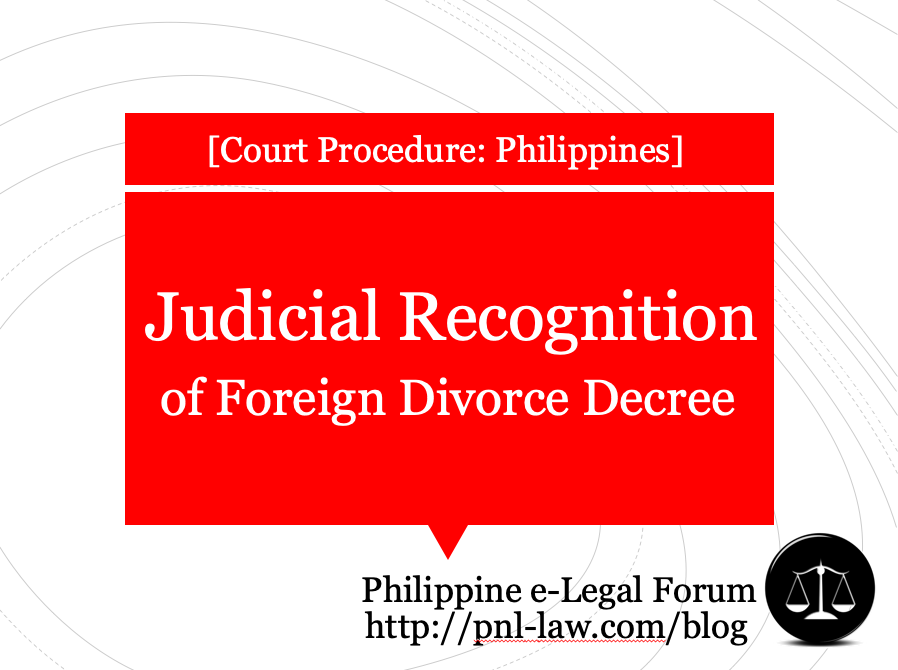A valid divorce decree obtained abroad is not automatically recognized in the Philippines. A foreign divorce decree must be proven, just like any fact, in the Philippine jurisdiction. The proper petition must be filed in court. The requirements and procedure for judicial recognition of a foreign divorce decree are discussed below.

I. VALID DIVORCE DECREE
The recognition of a divorce decree obviously requires the existence of a valid divorce decree secured abroad. The divorce decree may be issued pursuant to a “no-fault” (uncontested) or contested proceeding.
The foreign divorce decree may be issued through judicial or administrative proceedings (e.g., approved by mayor), so long as the divorce decree was secured in accordance with the laws and procedures in that jurisdiction. For instance, one case involved a divorce by agreement which becomes effective by notification, orally or in a document signed by both parties and two or more witnesses of full age, in accordance with the provisions of Family Registration Law of Japan.
The foreign divorce decree may be obtained by a foreigner or a Filipino, so long as the other spouse is a foreigner and the divorce decree capacitates the alien spouse to remarry. [See: Mixed Marriages and Divorce: When One Spouse is a Foreigner, Divorce is Recognized even if Initiated by the Filipino Spouse]
II. DOCUMENTS NEEDED
Philippine courts do not take judicial notice of foreign laws and foreign judgments. Therefore, these facts — the divorce decree and the national law of the foreign spouse — must be pleaded and proved like any other fact before trial courts. [See also Manner of Making Allegations in Pleadings]
The admissibility of official records that are kept in a foreign country requires that it must be accompanied by a certificate from a secretary of an embassy or legation, consul general, consul, vice consul, consular agent or any officer of the foreign service of the Philippines stationed in that foreign country (Rule 132, Section 24 of the Rules of Court).
This is done through the Authentication Certification (or “red ribbon“) issued by Philippine consuls in the jurisdiction where divorce decree was secured. In certain countries, the authentication may be secured more conveniently through the Apostille.
III. PREPARATION AND FILING OF THE PETITION
The documents (authenticated Divorce Decree and foreign law) can only be submitted to the court through the proper Petition, which must contain the requisite allegations, signed by the petitioner, and properly verified/authenticated. The Marriage Certificate must also be attached to the petition.
The action for recognition of a foreign divorce decree may be made in: (a) an action instituted specifically for the purpose; or (b) in another action where a party invokes the foreign decree as an integral aspect of his claim or defense. This is according to the Supreme Court in the case of Sto. Tomas, cited in Cote.
The verified petition is filed in the province where the corresponding civil registry is located. No entry in a civil register (including a person’s status, whether single or married) shall be changed or corrected, without the proper court order.
[See also When Foreigner-Spouse May File the Petition for Judicial Recognition in the Philippines]
IV. COURT HEARING
The appropriate parties, including the foreign spouse and the local civil register, must be impleaded in the petition. Summons must be served on these respondents. There is a proper way to serve summons on the foreign spouse who, in most likelihood, is abroad.
The documents, even if complete and authenticated, do not prove themselves in court. These documents, as well as other relevant facts in the petition, must be covered by the testimony of the proper party.
Regional Trial Courts shall hear and decide all petitions for recognition of foreign judgment, order or decree. The trial court must be guided by the following:
- As to procedure, Rule 108 of the Rules of Court.
- As to proof, Section 48(b) of Rule 39, and Sections 24 and 24 of Rule 132, Rules of Court, on “Proof of official record” and “What attestation of copy must state”.
The Office of the Solicitor General (OSG) participates in the proceedings. The OSG can do this directly but, in most cases we handled, the OSG deputizes the public prosecutor to appear in the case. The OSG, or the public prosecutor, is duty-bound to ensure that the institution of marriage is amply protected.
V. FINALITY OF THE COURT ORDER
A judgment of divorce is a judicial decree, although a foreign one, affecting a person’s legal capacity and status that must be recorded with the local civil registry. It cannot, however, be directly registered with the local civil registry. Philippine regulations require that there must be a final order from a competent Philippine court before a foreign judgment, dissolving a marriage, can be registered in the civil registry.
Once the court grants the appropriate petition, the petitioner must wait for the issuance of the Certificate of Finality. This may take some time because, based on our experience, the OSG may seek a reconsideration of the decision or appeal the case.
VI. REGISTRATION WITH THE CIVIL REGISTRY
The local civil registry office or the Philippine Statistics Authority (PSA) cannot register the foreign divorce decree with the mere presentation of the foreign divorce decree. There must be a final court order recognizing the foreign divorce decree. If everything is in order, the local civil registrar annotates the decision in the Marriage Certificate.
[Sources: Republic vs. Cote, G.R. No. 212860, 14 March 2018; Corpuz vs. Sto. Tomas, G.R. No. 186571, 11 August 2010; Racho vs. Tanaka (G.R. No. 199515, 25 June 2018; Racho vs. Tanaka, G.R. No. 199515, 25 June 2018]
- Twin-Notice Rule and Procedural Requirements in Employment Termination Proceedings - June 3, 2020
- When Travel Pass is Needed for Interzonal Travel during Community Quarantine - June 1, 2020
- Can Companies Compel Employees to Work during the General Community Quarantine (GCQ) and Impose Disciplinary Sanctions - May 29, 2020
